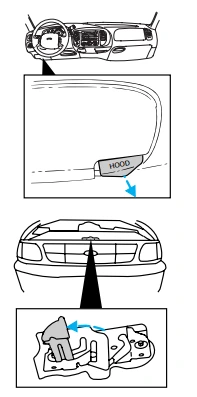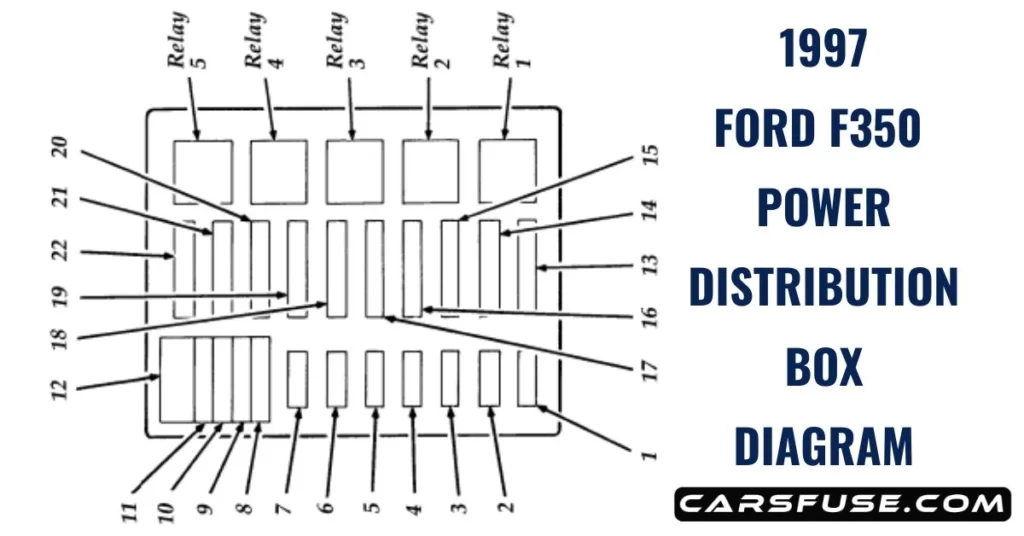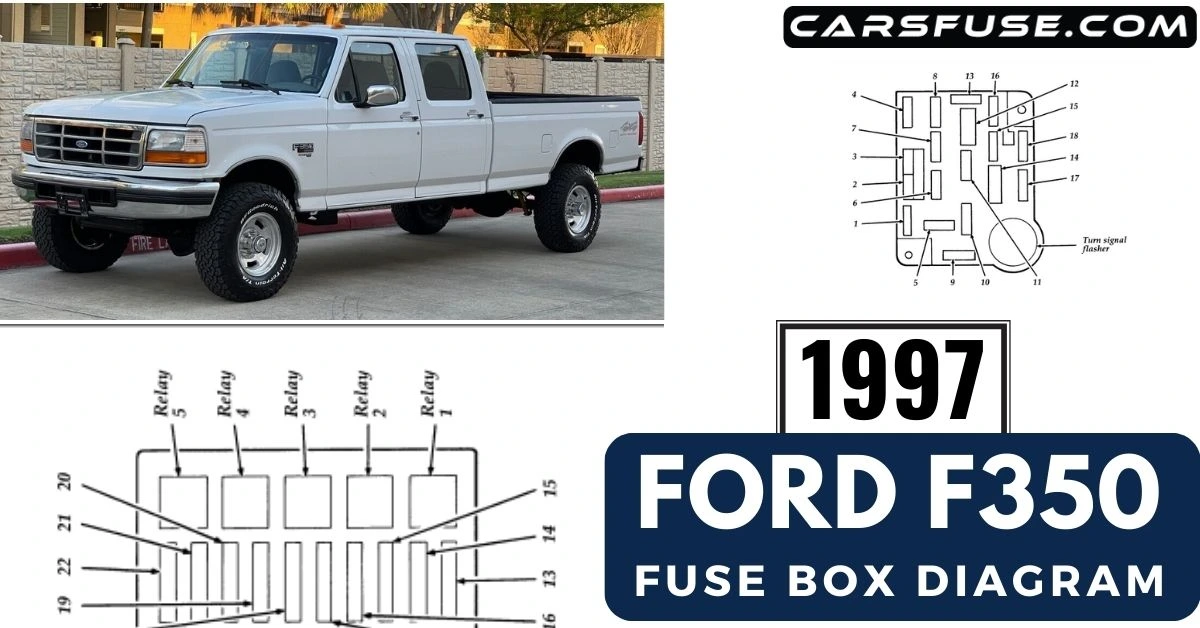In this article, we will discover the specifics of the 1997 Ford F350 fuse box diagram, helping you grasp the different fuses and their corresponding functions. Equipped with this knowledge, you’ll be better prepared to efficiently identify and resolve electrical issues, ultimately saving both time and money.
Table of Contents
Ford F350 Heavy Duty Fuse Box Diagram
Fuses, circuit breakers, and fuse links are essential for safeguarding your vehicle’s electrical system against overloading. If you observe certain electrical components in your vehicle not working, it’s possible that an overload has occurred, leading to a blown fuse or a tripped circuit breaker. Instead of immediately replacing or repairing the affected electrical parts, it’s advisable to first inspect the corresponding fuses or circuit breakers.
The provided charts contain valuable information regarding which fuses or circuit breakers are responsible for protecting each specific electrical component in your vehicle. It’s crucial to understand that if a fuse blows or a circuit breaker opens a circuit, all the components relying on that particular circuit will cease to function.

| Fuse/CB Loe. | Fuse Amp. Rating | Description |
| 1 | 30 Amp | Heater Air conditioner blower |
| 2 | 30 Amp | • Wiper / Washer |
| 3 | 3 Amp | • Idle position switch (Diesel) |
| 4 | 15 Amp | • Exterior lamps• Instrument illumination• Trailer exterior lamp relay• Waming buzzer Ichime module |
| 5 | • Not used | |
| 6 | 15 Amp | • Air conditioner clutch• Diesel auxiliary fuel selector• Remote keyless entry |
| 7 | 15 Amp | • Turn lamps |
| 8 | 15 Amp | • Courtesy Idome/ cargo lamps• Electric outside mirrors• Keyless entry• Speedometer• Waming buzzer Ichime module |
| 9 | 25 Amp | • Power point |
| 10 | 4 Amp | • Instrument illumination |
| 11 | 15 Amp | • Radio• Radio display dimmer |
| 12 | 20 Amp Circuit Breaker | • Power door locks• Power driver seat• Power lumbar |
| 13 | 15 Amp | • Anti-lock brakes• Brake shift interlock• Electronic engine control• Speed control• Stop/ hazard lamps• Stop sense for electronic engine control | |
| 14 | 20 Amp C.B. | • Power windows | |
| 15 | 20 Amp | • Anti-lock brakes | |
| 16 | 15 Amp | • Cigarette lighter• Generic Scan Tool | |
| 17 | lO Amp | • Diesel indicators• Electronic transmission• Gauges• Tachometer• Waming buzzer Ichime module• Waming indicators | |
| 18 | lO Amp | • Brake shift interlock• Speedometer• Selectable RPM control (Diesel)• Speed control (Diesel) | |
| Circuit Protected | Size | Location | |
| Headlamps & High Beam Indicator | 22 Amp Circ. Brkr. | Integral with Headlamp Switch | |
| Windshield Wiper and Washer Pump | 30 Amp Fuse | Fuse Panel | |
| Electric Brakes (Trailer) | 30 Amp Maxi Fuse | Power Distribution Box | |
| Trailer Lam.)s (Relay Feed | 25 Amp Fuse | Power Distribution Box | |
| Alternator, 95 Amp | 12 Ga. Fuse Link | At Starting Motor Relay (Gasoline Engine) | |
| Alternator, 130 Amp | (2) 12 Ga. Fuse Links | At Starting Motor Relay (Diesel Engine) | |
| Powertrain Control Module | 20 Amp Maxi Fuse | Power Distribution Box | |
| Fuel Pump | 20 Amp Maxi Fuse | Power Distribution Box | |
| Headlamp Switch | 40 Amp Maxi Fuse | Power Distribution Box | |
| Diesel Glow Plugs | (2) 14 Ga. Fuse Links | At Starting Motor Relay | |
| Power Windows | 20 Amp C.B. | Fuse Panel | |
| Power Door Locks | 20 Amp C.B. | Fuse Panel | |
| Hazard Flashers | 15 Amp Fuse | Fuse Panel | |
| Trailer Battery Recharge Feed | 30 Amp Maxi Fuse | Power Distribution Box | |
1997 Ford F350 Fuse Box Diagram (Power Distribution Box)
The high current fuses contained in the Power Distribution Box protect your vehicle’s main
electrical systems from overloads; these fuses provide the connection between the battery and
your vehicle’s electrical systems.
The high current fuses are coded as follows: 30 amp — light green, 40 amp — orange, 50 amp — red, 60 amp — blue.
Steps to open the hood of the 1997 Ford F350

To access the engine compartment of your vehicle, follow these steps:
- Find the hood release handle located beneath the bottom left corner of the instrument panel inside the vehicle. This handle is typically positioned near the driver’s side footwell.
- Pull the hood release handle firmly to activate the primary latch that secures the hood. You may need to exert some force, but the hood should release.
- Once you’ve pulled the hood release handle, move to the front of the vehicle. Look for the auxiliary latch, which is situated under the right center of the hood.
- Locate the handle or mechanism associated with the auxiliary latch and release it. This can usually be done by sliding the handle or disengaging the mechanism, depending on your vehicle’s design.
- With the auxiliary latch now released, you can gently lift the hood upward. The lift cylinders in place should support the hood, allowing it to stay open.
Important Notes
- Ford recommends that high-current fuses be replaced by a qualified technician.
- A blown high current fuse may be replaced but will continue to blow until the cause of the overload condition is corrected.

| Fuse/CB/ Relay Loe. | Fuse Amp. Rating | Description |
| 1 | 20 amp | Audio power |
| 2 | (15 amp) | Fog lamps200 Amp alternator (Diesel ambulance only) |
| 3 | 30 amp | Daytime running lamps (Canada only) Headlamp flash-to-passHorn |
| 4 | 25 amp | Trailer back-up lampsTrailer running lamps |
| 5 | 15 amp | Back-up lampsDaytime running lamp module (DRL) (Canada only)Oxygen sensor heaterTrailer battery charge relay |
| 6 | lO amp | Trailer right-hand stop/ turn lamp |
| 7 | lO amp | Trailer left-hand stop/ turn lamp |
| 8 | 30 ap maxi | Injector driver module |
| 9 | 30 amp (Gas) 20 amfJ (Diese ) | Powertrain control system |
| 10 | 20 amp maxi | Instrument panel fuses: 15, 18Starter relay coil |
| 11 | – | Not used |
| 12 | Diode | Powertrain control system relay coil |
| 13 | 50 amp maxi | Instrument panel fuses: 5, 9, 13 |
| 14 | – | Not used |
| 15 | 50 amp maxi | Instrument panel fuses: 1, 7Power distribution box: fuse 5 |
| 16 | 20 amp maxi | Fuel pump feed (Gas engine) |
| 17 | 50 amp | Alternator Charge Lamp Idle Position Switch (Diesel) Instrument Panel Fuses: 2, 6, 11, 14, 17 Power Distribution Box: Fuse 22 |
| 18 | 30 amp maxi | Trailer Battery Charge |
| 19 | 40 amp maxi | Headlamps |
| 20 | 50 amp maxi | Instrument Panel Fuses: 4, 8, 12, 16 |
| 21 | 30 amp maxi | Trailer Brake Feed |
| 22 | 20 amp maxi (Gas) 30 amp (Diesel) | Distributor Pickup (Gas Engine) Fuel Line Heater (Diesel) Glow Plug Controller (Diesel) Ignition Coil (Gas Engine) Powertrain Control System Relay Coil Thick film integrated (TFI) module (Gas Engine) |
| Relay 1 | Powertrain Control System | |
| Relay 2 | Fuel Pump (Gas Engine) Injector Driver Module (IDM Relay) (Diesel) | |
| Relay 3 | Horn | |
| Relay 4 | Trailer Tow Lamps | |
| Relay 5 | Not Used |
Tom Smith is a passionate car mechanic and automotive enthusiast, specializing in the intricate world of car fuse boxes. With years of hands-on experience under the hood, he has earned a reputation as a reliable expert in his field. As the founder and content creator of the popular blog website 'carsfuse.com,' Tom has dedicated himself to sharing his extensive knowledge of car fuse boxes and electrical systems with the world.

